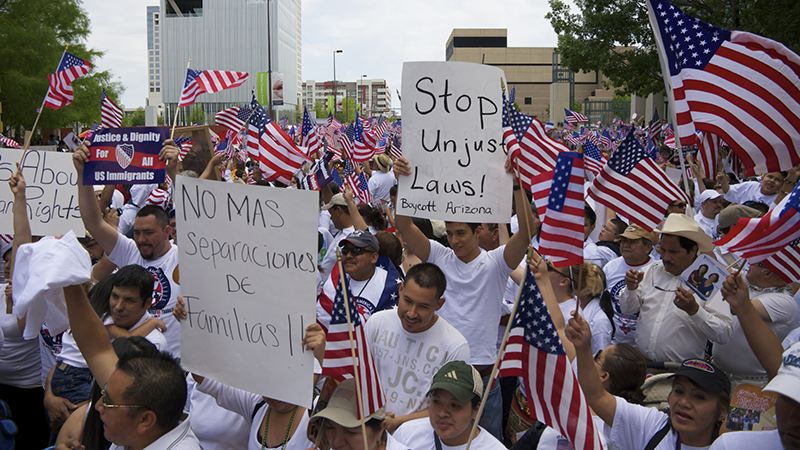Supreme Court Tie on Immigration Case Affects Thousands in Colorado
Leer en español
Protesters at an immigration rights demonstration in Dallas, Texas, in 2010. Photo by FireAtDusk via iStock
By Kristin Jones
As many as 65,000 people in Colorado will not be protected from deportation or allowed to work legally in the U.S. as a result of the June 23 Supreme Court deadlock on a case challenging President Obama’s immigration plan.
Justices were divided 4-4 over states’ challenge to an executive action that would have shielded parents of legal citizens and green card holders from deportation. The deadlock sets no precedent, but leaves in place an appeals court decision in favor of the states.
The executive action would have shielded as many as 62,000 individuals in Colorado who are parents of citizens and lawful residents, as well as 3,000 people eligible under the 2014 expansion of a program protecting people who arrived in the U.S. as children, according to the Migration Policy Institute, a Washington, D.C.-based think tank that studies global migration.
Ricardo Martinez leads Denver-based immigrant-rights advocacy group Padres & Jóvenes Unidos, a grantee of The Colorado Trust. He says the Supreme Court decision is a disappointment.
“Families are going to continue to live with this fear of being split,” says Martinez. “As a parent, you live with this fear that you’re not going to make it home. As a youth, you’re worried that your parents are not going to make it home.”
That’s a constant source of stress and fear that affects nearly all aspects of daily life, including health, says Martinez.
“We’ve definitely seen people who will not raise complaints about conditions, whether it’s housing or not being paid,” he says. “Most [undocumented immigrants] don’t have health insurance, and access to health care is a tremendous cost—even just going to the dentist for themselves or their kids.”
Lizeth Chacon is executive director of the Colorado People’s Alliance, which advocates for immigration reform. She describes Obama’s executive actions as a hard-won victory resulting from years of organizing and advocacy by immigrants and their families in the U.S.
“Today’s decision is devastating for folks,” she says. “We’re sad and we’re angry, but we’re going to use that to take action.”
Chacon says the decision—and the anti-immigrant politics that have come to the forefront in this election season—are a wake-up call. Much will depend, she says, on the next president and who is appointed to the Supreme Court, as well as congressional elections. Her organization is stepping up efforts to help people who are eligible to become citizens take that step, and to register and mobilize voters.
Community-organizing group Together Colorado, a Trust grantee, estimates that there are 21,000 eligible voters in Colorado who have a family member that would have directly benefited from the protections scuttled by today’s court decision.
“We know the Latino vote is critical. It’s critical in Colorado,” says Chacon. “We want to elect people who are going to protect our rights as an immigrant community.”
It’s an issue that affects more than just that community, Martinez adds.
“It doesn’t do our state any good to have so many folks living in fear,” he says. “It’s not a good place to be. It’s not a humane place to be.”
The Colorado Trust is a foundation that works to advance health equity for Coloradans. The fear of deportation and practical obstacles facing undocumented immigrants in Colorado are among social determinants of health that contribute to health inequities in our state.

